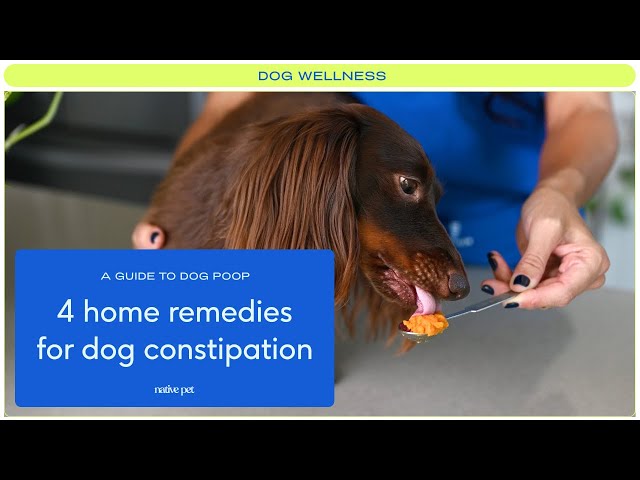For a dog’s constipation home remedy, consider adding fiber-rich foods like canned pumpkin or carrots to their diet. Additionally, ensure they have access to fresh water at all times to maintain hydration.
You can also try gentle exercises to encourage bowel movements, but if the problem persists, consult a veterinarian for further advice. Constipation can be uncomfortable and distressing for your furry friend. As a responsible pet owner, you may be eager to provide relief without relying solely on medication.
Fortunately, there are several safe and effective home remedies for treating constipation in dogs. By making simple dietary adjustments and promoting regular exercise, you can often alleviate this issue naturally. Implementing these strategies can help your dog find comfort and get back to their normal routine.
Understanding Canine Constipation
Signs your dog may be constipated: It’s important for dog owners to recognize the signs of constipation in their pets. Some common signs include straining during bowel movements, infrequent or difficult defecation, and small or dry stools. Additionally, your dog may exhibit signs of abdominal discomfort and loss of appetite.
Common causes behind the issue: There are several factors that can contribute to canine constipation. These include inadequate fiber intake, dehydration, lack of exercise, and certain medications. It’s also important to consider whether your dog has ingested any foreign objects that could be causing an obstruction. In such cases, it’s best to consult with a veterinarian to determine the appropriate course of action.
Choosing Natural Solutions
When a dog is experiencing constipation, it can be distressing for both the pet and the owner. Home remedies for dogs can offer a natural and gentle option for easing this discomfort. The benefits of using a home remedy for constipation in dogs include avoiding harsh chemicals and potential side effects, promoting digestive health, and providing a gentle solution. Natural solutions can include dietary changes, such as increasing fiber intake and hydration, as well as the use of herbal remedies. It is important to always consult with a veterinarian before beginning any home treatment to ensure the remedies are safe and appropriate for the individual dog.
Pumpkin: A Natural Laxative
Pumpkin: A Natural Laxative
Pumpkin is rich in fiber, aiding in digestion and regulating bowel movements. Its high water content helps soften stool and facilitate smoother passage. Additionally, the soluble fiber in pumpkin promotes the growth of beneficial gut bacteria, enhancing overall gut health.
How pumpkin aids in digestion:
Pumpkin’s high fiber and water content work cohesively to alleviate constipation. Fiber adds bulk to stool, easing its passage, while water softens it. Furthermore, the soluble fiber supports healthy gut flora, promoting regularity and alleviating constipation. Incorporating pumpkin into a dog’s diet in various forms such as canned, cooked, or pureed can effectively provide relief from constipation.
Serving suggestions for constipation relief:
To resolve constipation, include pureed or cooked pumpkin into your dog’s meals. This aids in regulating bowel movements and promoting digestive health. A recommended serving size is 1-4 tablespoons per meal, depending on the dog’s size and severity of constipation.

Credit: www.usafibroidcenters.com
Additional Fiber Sources
Certainly! Here’s the content in HTML format:
Other fruits and vegetables that can help relieve constipation in dogs include pumpkin, sweet potatoes, apples, and carrots. These high-fiber options can aid in digestion and alleviate constipation. Serving sizes should be appropriate for your dog’s size and weight to prevent any potential digestive issues. Consult with your veterinarian to determine the ideal portions for your dog to ensure effective relief without causing any adverse effects. Careful consideration should be given to the quantity and frequency of these fiber sources to maintain a balanced diet and promote overall well-being.
Importance Of Water Intake
Dogs rely heavily on adequate water intake to maintain a healthy digestive system. Dehydration can lead to constipation and make it difficult for your dog to pass stools. To ensure your dog stays hydrated, always make sure that fresh and clean water is readily available to them. Monitor their water consumption and encourage them to drink more water, especially during hot weather or after physical activity. You can also consider adding hydration-enhancing foods to their diet, such as canned dog food or moistened kibble. These additions can help increase your dog’s overall water intake, promoting regular bowel movements and preventing constipation.
Regular Exercise For Regularity
Regular exercise is essential for maintaining bowel regularity in dogs. Exercise routines such as daily walks or playtime can help promote bowel movements and prevent constipation. Aim for at least 30 minutes of physical activity every day to keep your dog’s digestive system functioning properly. Additionally, incorporate activities that engage the abdominal muscles, such as running and jumping, as these movements can aid in stimulating bowel activity. Providing your dog with ample opportunities for physical activity is a proactive approach to combating constipation and promoting overall digestive health.
Oil-based Remedies
When it comes to dog constipation, oil-based remedies can be effective. One option is to administer olive oil, which has natural laxative properties. It can be given directly or mixed with the dog’s food. However, it’s important to ensure safe administration to avoid any potential choking hazards or digestive issues. It’s best to consult with a veterinarian to determine the appropriate dosage and method of administration for your dog. Additionally, other oil-based remedies such as coconut oil may also be beneficial for relieving constipation in dogs.
Probiotic Supplements
Probiotic supplements can play a crucial role in maintaining a dog’s digestive health. Certain probiotic strains are particularly beneficial for dogs dealing with constipation. Lactobacillus acidophilus and Bifidobacterium are two of the most recommended probiotic strains for dogs. These strains aid in promoting a healthy balance of gut bacteria and can help alleviate constipation by improving digestive function. Incorporating probiotic supplements into a dog’s diet may provide relief from constipation and contribute to overall gut health.
Belly Rubs For Bowel Movement
Constipation in dogs can be uncomfortable for them, but there are home remedies you can use to help alleviate their symptoms. Abdominal massages can aid in stimulating bowel movements. When using this technique, it’s essential to be aware of any signs of discomfort from your dog and stop immediately if they show any signs of distress. Be mindful of the pressure applied during the massage and adjust it according to your dog’s comfort level. Additionally, ensuring your dog has access to plenty of water and a fiber-rich diet can also help in relieving constipation. However, if the problem persists or worsens, consulting with your veterinarian is recommended for further guidance.
Warm Baths For Comfort
Giving your dog a warm bath can provide relief and help facilitate bowel movements. The warmth of the water can relax their muscles and ease discomfort, making it easier for them to pass stool. To ensure a stress-free bath time, it’s important to create a calming environment and use mild, dog-friendly shampoo. Additionally, be mindful of the water temperature, as it should be comfortably warm but not hot. Allowing your dog to soak in the bath for a few minutes can also help stimulate their digestive system and encourage bowel movements.
Dietary Additives For Constipation
When it comes to addressing constipation in dogs, natural laxatives can be administered in safe doses to relieve the condition. Common natural laxatives such as pumpkin, flaxseed, and bran can be added to a dog’s diet to promote bowel movements. Pumpkin, in particular, is a safe and effective remedy due to its high fiber content. However, it’s important to always consult with a veterinarian to determine the appropriate dosage for a dog’s size and breed.
Additionally, certain foods can exacerbate constipation in dogs and should be avoided. Processed foods, dairy products, and bones are known to contribute to constipation and should be kept out of a dog’s diet when they are experiencing digestive issues.
Home Remedy Recipes
Home Remedy Recipes: If your dog is experiencing constipation, natural ingredients may help alleviate the issue. You can try a simple concoction using 100% pure canned pumpkin. Feed your dog 1-4 tablespoons, depending on their size, with each meal until the constipation improves. Another option is to mix 1-2 teaspoons of coconut oil with your dog’s food to help with digestive issues. Additionally, bone broth can aid in relieving constipation in dogs. For preparation, mix 1-2 tablespoons of bone broth with your dog’s food. These simple remedies can help address your dog’s constipation issues naturally.
When To See A Vet
If your dog shows signs of prolonged constipation, such as straining to defecate or passing dry, hard stools, it’s essential to consult with a veterinarian. Additionally, watch out for other symptoms like loss of appetite, lethargy, vomiting, or bloody stool, as these could indicate a more serious underlying issue.
Tracking Your Dog’s Progress
Keeping a log of bowel movements and diet: When dealing with your dog’s constipation, it’s important to track their progress. Keep a detailed log of their bowel movements and diet, noting any changes or improvements. This will help you and your veterinarian evaluate the effectiveness of the home remedies you are using.
Frequently Asked Questions For What To Give A Dog For Constipation Home Remedy
What Are The Common Causes Of Constipation In Dogs?
Constipation in dogs can be caused by lack of fiber, dehydration, or medical conditions. Ingestion of foreign objects or hairballs can also lead to constipation.
How Can I Relieve My Dog’s Constipation At Home?
You can add fiber to your dog’s diet, increase water intake, and encourage exercise. Additionally, pumpkin, olive oil, and certain fruits can help relieve constipation in dogs.
When Should I Take My Constipated Dog To The Vet?
If your dog’s constipation persists for more than 24 hours, or if it is accompanied by vomiting or lethargy, consult your veterinarian immediately. In some cases, constipation may indicate a more serious underlying condition.
Conclusion
Addressing your dog’s constipation with home remedies can offer natural relief. Whether it’s pumpkin, probiotics, or increased water intake, these solutions can be effective. Always consult your veterinarian to ensure the best care for your furry friend. With the right approach, you can ease your dog’s discomfort and promote their overall well-being.



